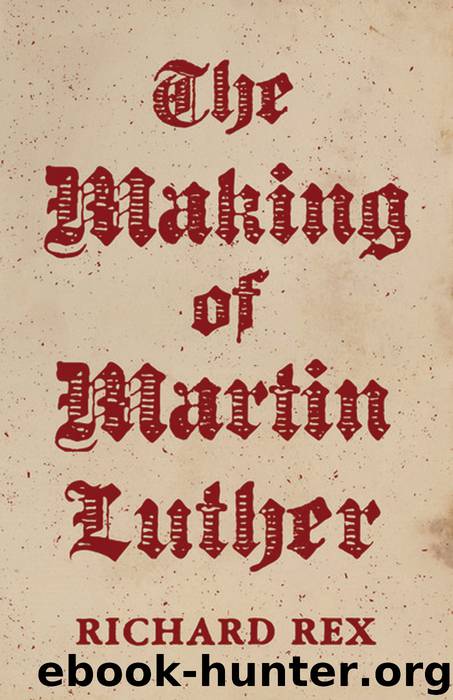The Making of Martin Luther by Rex Richard;

Author:Rex, Richard; [Rex, Richard;]
Language: eng
Format: epub
ISBN: 9780691155159
Publisher: Princeton University Press
Published: 2017-01-15T07:00:00+00:00
8
WORMS AND THE WARTBURG
Charles V (only 19 years old when elected Holy Roman Emperor) was not even present for his own election. He voted for himself by proxy and was elected in absentia on 28 June 1519, the same week that saw the commencement of the Leipzig Disputation. Charles, who had been brought up in the Netherlands, had at that point been in Spain for nearly two years, getting to know the kingdoms that he had inherited in 1516. There is no evidence that Luther’s ideas had yet reached Spain, nor that Charles had so much as heard of the troublesome friar. He set out from La Coruña in May 1520, leaving his subjects seething with resentment at the idea of sharing their king with the Empire while paying handsomely in extra taxes for this dubious privilege. (A rebellion ensued.) He was in Flanders by June. The Holy Roman Empire was deficient in central control at the best of times, but a half-year interregnum followed by a year of absentee government gave Luther the best possible chance for survival and success. The self-important papal agent, Karl von Miltitz, hung around various princely courts, ineffectually seeking some progress or compromise on the Luther business. But nobody was paying much attention. Nor was Charles in any great hurry to get to Germany. He stayed in the Netherlands for several months, making two trips to visit Henry VIII, once at Canterbury and then again at Calais. A political alliance against the French was more important to him than a dissident friar in Saxony. By the time he reached Aachen for his initial coronation as “King of the Romans” in October, it was almost two years since Maximilian had died. Luther himself acknowledged long afterwards how much the emperor’s timely death and the consequent interregnum had assisted the cause of the “Gospel.”1
The greatest test of Luther’s career was his summons to appear before the emperor, princes, and prelates gathered at the Reichstag (or “Diet”) in Worms. He had been guaranteed safe-conduct by Charles V, but he was understandably far from secure about it. According to some canon lawyers, there was no obligation to keep one’s word with heretics. Just over a hundred years before, the Czech dissident Jan Hus had been summoned under a similar safe-conduct to appear not before the Reichstag but before a general council of the Church, convened at Constance. With his heresies condemned, yet refusing to recant, Hus was arrested notwithstanding Emperor Sigismund’s guarantee, and was tried, convicted, and burned alive. The history of Hus was well known, and Luther frequently alluded to it. The heightened excitement of his letters in the approach to the Reichstag betrays a nervous intensity remarkable even by his standards. He was expecting nothing less than martyrdom, and his ultimate departure from Worms in one piece may have come not only as a surprise but even as a kind of disappointment, or at least an anticlimax.
Papal diplomacy was keen to engage with the new emperor over Luther.
Download
This site does not store any files on its server. We only index and link to content provided by other sites. Please contact the content providers to delete copyright contents if any and email us, we'll remove relevant links or contents immediately.
| Military | Political |
| Presidents & Heads of State | Religious |
| Rich & Famous | Royalty |
| Social Activists |
Waking Up in Heaven: A True Story of Brokenness, Heaven, and Life Again by McVea Crystal & Tresniowski Alex(37005)
Empire of the Sikhs by Patwant Singh(22174)
We're Going to Need More Wine by Gabrielle Union(18075)
Hans Sturm: A Soldier's Odyssey on the Eastern Front by Gordon Williamson(16667)
Leonardo da Vinci by Walter Isaacson(11907)
The Radium Girls by Kate Moore(10910)
Educated by Tara Westover(7065)
Tools of Titans by Timothy Ferriss(6952)
How to Be a Bawse: A Guide to Conquering Life by Lilly Singh(6695)
The Last Black Unicorn by Tiffany Haddish(5076)
Permanent Record by Edward Snowden(5001)
The Rise and Fall of Senator Joe McCarthy by James Cross Giblin(4848)
Promise Me, Dad by Joe Biden(4451)
The Wind in My Hair by Masih Alinejad(4426)
The Crown by Robert Lacey(4108)
A Higher Loyalty: Truth, Lies, and Leadership by James Comey(4034)
The Iron Duke by The Iron Duke(3641)
Joan of Arc by Mary Gordon(3260)
How to be Champion: My Autobiography by Sarah Millican(3189)
